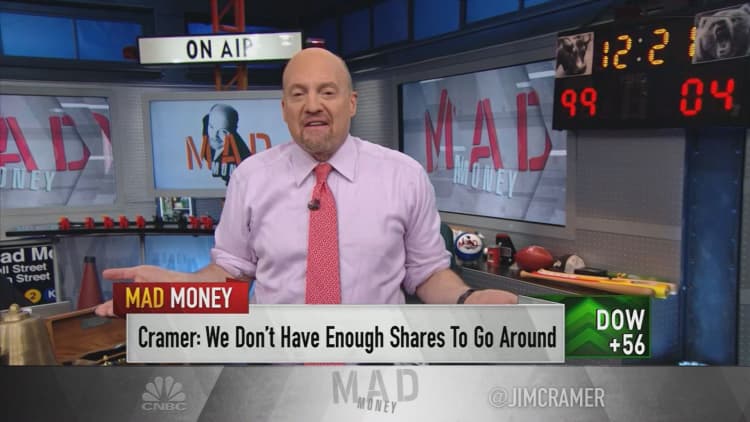
As 2017 comes to a close, CNBC's Jim Cramer has noticed that one of the market's starkest features is its shortage of stock.
"We don't have enough shares to go around. That's how I feel about this incredibly strong year and the uber-bullish reaction to tax reform," the "Mad Money" host said. "There's just not enough supply, not enough stock to meet the demand from buyers who had to radically switch their orientation to deal with a much more positive backdrop."
Cramer tends to be skeptical when people bring up stock shortages, because bankers are usually prepared to issue shares to meet the market's demand, this time is different, he said.
"It's not a wholesale shortage of stock. It's a shortage of stocks that fit the program, meaning stocks belonging to companies that are high domestic taxpayers and thus just got a big boost to their earnings," he explained.
Ironically, Cramer found that two similar companies — Amazon and Walmart — best explain this oddity.
One one end there's Walmart, which pays a 32 percent effective tax rate that, with the GOP's tax overhaul, will soon be slashed to 21 percent. That makes it an attractive investment in this climate, but the company has been consistently buying back stock.
On the other end sits Amazon, which doesn't pay very many taxes despite having a 43 percent effective rate and has been consistently issuing stock over time.
The companies' 10-year track records are telling. Ten years ago, Walmart had 4.1 billion shares outstanding; as of last count, it had just under 3 billion. Over the same time period, Amazon's share count grew from 424 million to 494 million.
"Now, when portfolio managers want to reach for a big company that's a major beneficiary of the tax reform, you know what? They're thinking Walmart, not Amazon," Cramer said. "In fact, you can easily imagine them dumping the fast-growing e-commerce play for Walmart here."
Walmart's Jet.com business and "buy online, pick up in-store" initiatives were already attractive. Now, investors are eyeing the its stock thanks to new employee-friendly policies that keep workers there longer, thus cutting training costs, Cramer said.
"Walmart's got great fundamentals and it very much fits this program, ... but because of the buybacks, its stock is in even shorter supply than it would look like given that it is a $290 billion company," the "Mad Money" host said. "Meanwhile, Amazon very much does not fit the program and there are a lot more shares to go around right now, floating all over the place."
Certainly, Cramer was still bullish on the prospects for Amazon, the original A in his ubiquitous acronym, FANG.
Sellers of Amazon would probably regret it once they saw the online giant's likely robust holiday sales, and once the tax plan's benefits to Walmart were priced in, he argued.
"I'd be a buyer of Amazon into any weakness," Cramer said. "But given that the passage of the bill was a surprise and the analysts are just now putting pen to paper to figured out its impact, my guess is that the out-of-Amazon-into-Walmart trade ... could continue for longer than people think."
Amazon's issue stretches beyond its own stock, he added. Tech companies large and small have a lot of stock supply and aren't the biggest beneficiaries of the GOP tax plan, so they likely won't get much of a boost going into 2018.
At the same time, companies are still parsing how dramatically changes to the tax code could impact earnings, so Cramer weighed the possibility that the benefits could be even greater than expected.
"As always, there are things that could go wrong, especially some exogenous situation, a black swan," he said. "The bottom line is that we're in a different, better and cheaper kind of market here. I'm the only one that seems to want to say it, but I don't care. I think it brings buyers in from the sidelines. Yep, we're looking at a wholesale re-allocation of capital that means you can keep buying this market on any dip, perhaps for quite some time to come."
WATCH: Cramer tracks the market's 'stock shortage'

Questions for Cramer?
Call Cramer: 1-800-743-CNBC
Want to take a deep dive into Cramer's world? Hit him up!
Mad Money Twitter - Jim Cramer Twitter - Facebook - Instagram - Vine
Questions, comments, suggestions for the "Mad Money" website? madcap@cnbc.com



